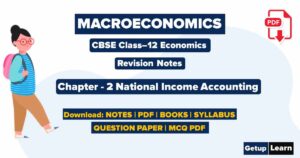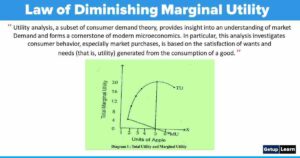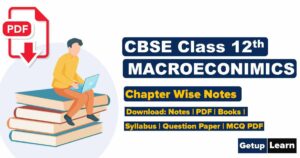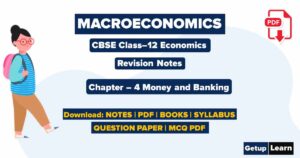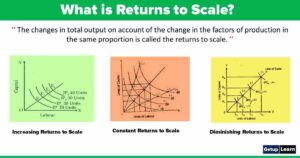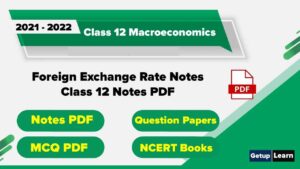Download introduction to macroeconomics class 12 pdf notes, Question papers, MCQ PDF, NCERT Books and Syllabus free of cost in just minutes. We provide complete study material of introduction to macroeconomics class 12 pdf.
In study material includes an introduction to macroeconomics class 12 pdf, previous year question paper class 12, Mcq Pdf, NCERT books, Latest syllabus by CBSE 2021-2020.
Download free pdf notes of macroeconomics class 12 note pdf. We are providing the best free CBSE revision notes for you so you can prepare for the exam. In macroeconomics class 12 notes introduction to macroeconomics and its concepts is the first chapter.
Table of Contents
- 1 Download Introduction to Macroeconomics Class 12 Notes PDF
- 2 NCERT Class 12 Macroeconomics Chapter 1 Introduction to Macroeconomics Notes PDF
- 3 Introduction to Macroeconomics Class 12 MCQ Questions PDF
- 4 Introduction to Macroeconomics Class 12 MCQ Questions and Answers PDF
- 5 National Income Accounting Class 12 Questions and Answers PDF
- 6 Introduction to Macroeconomics Class 12 Important Questions PDF
- 7 Introduction to Macroeconomics Class 12 Pdf | CBSE Macroeconomics Class 12 Notes
- 8 Introduction to Macroeconomics Class 12 Pdf Free Download
- 9 FAQ Related to Introduction to Macroeconomics Class 12 Notes
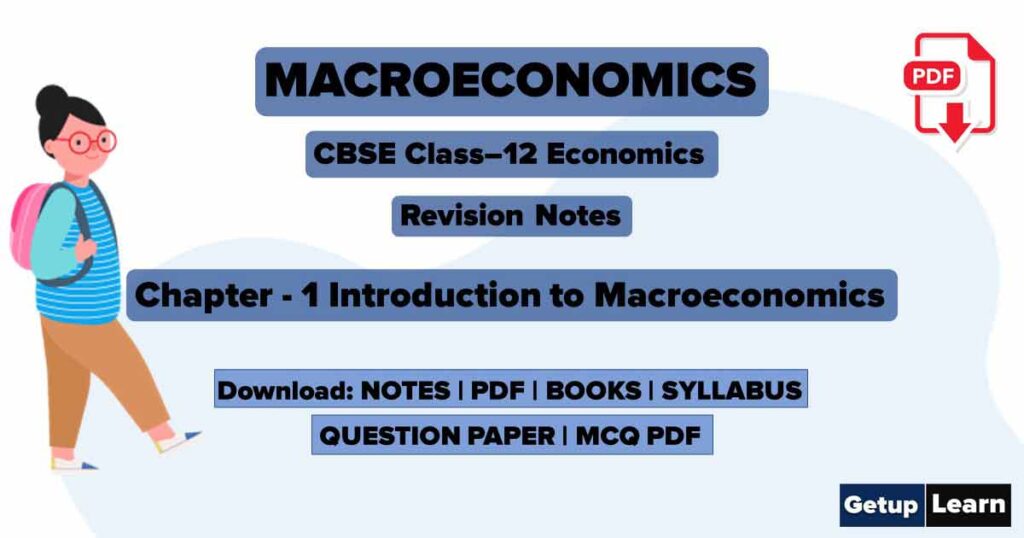
Table of Contents
You can download the introduction to macroeconomics class 12 notes pdf below the article.
Download Introduction to Macroeconomics Class 12 Notes PDF
This is a downloading table for download introduction to macroeconomics class 12 notes pdf:
| Introduction to Macroeconomics Class 12 | (HOW TO DOWNLOAD) |
| ????Introduction to Macroeconomics Class 12 Notes PDF | ????Download |
| ????Introduction to Macroeconomics Class 12 MCQ Questions PDF | ????Download |
| ????Introduction to Macroeconomics Class 12 MCQ Questions and Answers PDF | ????Download |
| ????Introduction to Macroeconomics Class 12 Questions and Answers PDF | ????Download |
| ????Introduction to Macroeconomics Class 12 Important Questions PDF | ????Download |
NCERT Class 12 Macroeconomics Chapter 1 Introduction to Macroeconomics Notes PDF
CBSE Class 12 Macroeconomics chapter 5 introduction to macroeconomics Notes PDF are made by research of last ten years NCERT question paper. Further, they are all designed with the latest CBSE guidelines 2022-2023, and only important topics are covered because of the high chances to appear in exams.
NCERT Class 12 Macroeconomics chapter 5 introduction to macroeconomics Class 12 Notes is very useful for students because it is necessary to understand all important questions and answer them in an efficient manner.
[su_button url=”https://drive.google.com/file/d/12XtuZ1K7MxEPKY5HKzDBajK5g8uta1fW/view” target=”blank” style=”flat” wide=”yes” center=”yes” radius=”10″ text_shadow=”0px 0px 0px #ffffff” download=”https://drive.google.com/file/d/12XtuZ1K7MxEPKY5HKzDBajK5g8uta1fW/view” id=”download”]Download PDF[/su_button]

Download All: ????Macroeconomics Class 12 Notes PDF????
Download Class 12th Notes PDF
[su_spoiler title=”Macroeconomics Class 12 | Indian Economy Class 12” style=”fancy” icon=”plus-circle”]
Macroeconomics Class 12
Indian Economy Class 12
- Indian Economy on the Eve of Independence
- Indian Economy 1950 to 1990
- Economic Reforms Since 1991
- Liberalisation Privatisation and Globalisation
- Poverty
- Human Capital Formation in India
- Rural Development
- Employment and Unemployment
- Infrastructure
- Environment and Sustainable Development
- Comparative Development Experiences of India and Its Neighbours
[/su_spoiler]
With these introduction to macroeconomics notes pdf sample papers, students will have no problem making revision notes before exams and they don’t have to waste time making CBSE revision notes. You guys can download macroeconomics notes class 12 in just minutes. Introduction to Macroeconomics Notes Pdf notes are well structured and prepared based on CBSE latest syllabus class 12 2022-2023.
These NCERT macroeconomics notes chapter 5 introduction to macroeconomics Notes PDF for class 12 are well-defined and easy-to-understand concepts and include some practical questions for practice purposes.
We provided CBSE notes in pdf format for Students and they can use sample papers for preparing for the CBSE board exam 2022-202. CBSE Class 12 macroeconomics chapter 5 introduction to macroeconomics Notes is very important for exam perspectives because it is a practical question chapter, not theory-based chapter. And for exam perspective this important chapter because it has higher marks weightage in macroeconomics.
With the help of CBSE revision notes students can revise for the exam. Class 12 macroeconomics Chapter 5 introduction to macroeconomics Notes are the best finest notes because these are prepared by very experienced teachers. Class 12 macroeconomics chapter 5 introduction to macroeconomics notes is made in very easy language which helps the students understand easily.
Introduction to Macroeconomics Class 12 MCQ Questions PDF
Below that you can download the introduction to macroeconomics class 12 MCQ questions pdf. We have covered all related MCQ’s introduction to macroeconomics class 12 MCQ questions in this pdf. You can practice all of them by these introduction to macroeconomics MCQ questions PDF.
Introduction to Macroeconomics Class 12 MCQ Questions and Answers PDF
Here are some of the introduction to macroeconomics class 12 mcq questions and answers pdf mentioned below. You can download introduction to macroeconomics class 12 MCQ pdf form. These are the most relevant MCQ questions and have a higher chance of appearing on exam papers.
National Income Accounting Class 12 Questions and Answers PDF
Here we are providing introduction to macroeconomics class 12 questions and answers pdf and in this notes we have covered all Important Questions and Answers from Chapter 4 introduction to macroeconomics. Introduction to Macroeconomics notes of Economics Class 12 Important Questions are the best resource for students which helps in class 12 board exams.
Introduction to Macroeconomics Class 12 Important Questions PDF
This is the introduction to macroeconomics class 12 important questions pdf which we are providing for you. We have selected all those important questions from previous years’ question papers. If you learn the following introduction to macroeconomics class 12 important questions you don’t have to open your textbook again and by these questions, you score high in exams.
Introduction to Macroeconomics Class 12 Pdf | CBSE Macroeconomics Class 12 Notes
In this introduction to macroeconomics and its concepts, you will learn about the basics of macroeconomics meaning of macroeconomics, the difference between microeconomics and macroeconomics, the scope and significance of macroeconomics, the importance of macroeconomics, the concept of microeconomics etc:
- Introduction of Macroeconomics
- Differences Between Micro and Macro Economics
- Scope of Macroeconomics
- Importance of Macroeconomics
- Difference Between Microeconomics and Macroeconomics
Introduction of Macroeconomics
Economics is divided into two different categories: Microeconomics and Macroeconomics. Microeconomics is the study of individuals and business decisions, while Macroeconomics looks at the decisions of countries and governments.
Macroeconomics is a part of the economic study which analyzes the economy as a whole. It is the average of the entire economy and does not study any individual unit or a firm. It studies the national income, total employment, aggregate demand and supply etc.
Differences Between Micro and Macro Economics
These are some basics of differences between micro and macroeconomics:
- Scale of Study
- Field of Study
- Importance Given to Price and Income Concepts
- Methods of Study
- Analytical Factors
Scale of Study
Macroeconomics is related to the study of the aggregate while microeconomics relates to the individual economic agents.
Field of Study
Macroeconomic analysis is concerned with the broadest level of policies pertaining to income, employment and growth of resources while microeconomics is concerned with problems and policies relating to the optimum allocation of resources and economic activities such a price determination.
Importance Given to Price and Income Concepts
The microeconomic analysis focuses on price determination in the market for goods and services while macroeconomics focuses on income determination in the economy as a whole. Every good and service has its market where buyers and sellers interact with one another to determine its price and quantity.
Since decisions are taken by the individual buyers who demand the goods and the sellers who supply the goods, it forms the part of microeconomics. On the other hand, the determination of income of the entire economy involves the mobilisation of resources by all the sectors of the economy taken together. So it forms the part of macroeconomics.
Methods of Study
The microeconomic study is dominated by the method called Partial Equilibrium Analysis which is focussed on significant factors related to economic activity. Under macroeconomics, the mutual dependence of important economic aggregates is studied and this is called Quasi General Equilibrium Analysis.
Analytical Factors
Microeconomics deals with the study of the behaviour of economic variables in an equilibrium position while macroeconomic analysis deals with the study of the behaviour of. economic aggregates in a disequilibrium position.
Scope of Macroeconomics
These are the scope of macroeconomics discussed below:
- National Income
- International Trade
- Employment
- General Price Level
- Money
- Trade Cycles
- Economic Growth
National Income
Macroeconomics studies the measurement and methods of calculating national income. This measurement involves aggregate saving, aggregate consumption and aggregate investment.
International Trade
International trade refers to the exchange of goods and services among different countries which affect the whole economy. Thus, international trade is studied under macroeconomics.
Employment
The study of employment level, types of unemployment and causes behind unemployment is studied under the scope of macroeconomics.
General Price Level
General Price level is affected through the business cycles. Inflation and deflation are two major factors studied for general price level in macroeconomics.
Money
In macroeconomics, various theories of money, the role of money, the effect of government expenditure and income in the economy are discussed.
Trade Cycles
The Trade cycle represents the ups and downs in the market. These ups and downs may be positive or negative. The study of trade cycles is included in macroeconomics as this is based on the whole economy.
Economic Growth
Macroeconomics theories are studied and applied for balanced economic growth. It is the major objective behind any economic policy formulation.
Importance of Macroeconomics
These are the importance of macroeconomics explained below:
- Helpful in Formulation of Economic Policies
- Helpful in Understanding the Functioning of an Economy
- Useful for Determining National Income
- Important for Economic Growth
- Useful for Development of Micro Economics
Helpful in Formulation of Economic Policies
Macroeconomics deals with the economy as a whole. It includes aggregates of all economic factors. Economic policies of the government are related to the whole economy.
Helpful in Understanding the Functioning of an Economy
Macroeconomic study the problems related with behaviour of total output, income, employment and general price level. It is necessary to have proper and adequate knowledge to understand the behaviour of the aggregate variables. Every country wants proper working on these problems for the smooth running of that country.
Through macroeconomics, these complex problems can be understood and solved. Thus, Macroeconomics is helpful to understand the functioning of an economy.
Useful for Determining National Income
The concept of National income is studied under the scope of macroeconomics. As the overall performance of any nation can only be determined through its national income. For solving the problems related to overproduction and unemployment it is necessary to prepare data on national income.
These data on national income are helpful in forecasting the level of economic activity and understanding the distribution of income among different sectors of the economy.
Important for Economic Growth
As we had discussed earlier that macroeconomics helps in the formulation of economic policies, these policies are formed for the future growth of an economy. These policies form the basis for the stable and long-run growth of an economy. There are various theories on unemployment, general prices and national income in macroeconomics that are helpful to solve the problems related to these issues. Thus, macroeconomics is helpful for economic growth.
Useful for Development of Micro Economics
Macroeconomic is helpful to understand microeconomics. Without a proper understanding of aggregates of facts, no microeconomics law can be formed. For example, the behaviour of a single firm cannot form the behaviour pattern for all firms.
As the behaviour of a single firm can be used for a single entity but it is not useful in the case of the economy as a whole. The theory was formed after considering the behaviour pattern of aggregate firms. Thus, macroeconomics is helpful for the development of microeconomics.
Difference Between Microeconomics and Macroeconomics
Let’s discuss the difference between microeconomics and macroeconomics in detail:
| Basis | Micro Economics | Macro Economics |
| Meaning | It studies individual units Of an economy | It studies the economy as a whole |
| Fields of Study | It studies individual economic units such as a consumer, a firm, a household, an industry a commodity etc. | It studies national Aggregate such as national income, national output, general price level, level of employment etc. |
| Problems | It deals with micro problems such as the determination of the price of the commodity, a factor of production, satisfaction of a consumer etc. | It deals with problems at a macro level like problems of employment, trade cycles, international trade, economic growth etc. |
| Nature | It is based on the disaggregation of units. It considers individual differences between different units. | It is based on the aggregation of units It does not consider individual differences between aggregates. |
| Objectives | Maximize utility, Maximize profits, Minimize costs, Static analysis i.e. | Full employment, Price stability, Economic growth, Favorable balance of payment situation. |
| Methodology | Does not explain the time element Equilibrium conditions are measured at a particular period. | Dynamic analysis i.e. it is based on time lags, rates of change, past and expected values of variables. |
Introduction to Macroeconomics Class 12 Pdf Free Download
CBSE Class 12 Macroeconomics chapter 1 introduction to macroeconomics Notes are made by research of last ten years NCERT question paper. Further, they are all designed with the latest CBSE guidelines 2021-2022 and only important topics are covered because of high chances to appear in exams. NCERT Class 12 Macroeconomics Chapter 1 introduction to macroeconomics Notes are very useful for students because it is necessary to understand all important questions and answer them in an efficient manner.
By these sample papers, students will have no problem making revision notes before exams and they don’t have to waste for making CBSE revision notes. You guys can download macroeconomics notes class 12 in just minutes. These notes are well structured and prepared on based CBSE latest syllabus class 12 2021-2022. These NCERT macroeconomics notes Chapter 1 introduction to macroeconomics notes for class 12 is well defined and easy to understand concepts and includes some practical questions for practice purposes.
We provided CBSE notes in pdf format for Students and they can use sample papers for preparing for the CBSE board exam 2021-2022. CBSE Class 12 macroeconomics Chapter 1 introduction to macroeconomics is very important for exam perspectives because it is a practical question chapter, not a theory-based chapter. And for exam perspective this important chapter because it has higher marks weightage in macroeconomics.
With the help of CBSE revision notes students can revise for the exam. Class 12 macroeconomics chapter 1 introduction to macroeconomics notes are the best finest notes because these are prepared by very experienced teachers. Class 12 macroeconomics chapter 1 introduction to macroeconomics revision notes are made in very easy language which helps the students understand easily.
So let’s talk about these notes in detail: first, we prepared three versions of the notes. In the first version of notes, we explain all topics with help of colours diagram because in humans emotions and visual information are processed at the same time in the human brain. so, images and diagrams help to learn easily. Second, We prepared short revision notes which help you to revise before the CBSE board exam. Macroeconomics short notes are 2 to 4 pages long which is not that lengthy. Each topic is explained very well with a short and accurate definition or concept. Third, In the third version of notes is very lengthy because each topic is explained in detail with help of examples if needed. We cannot say these notes are for exam revision purposes because these are too long this is only for study purposes.
we recommend studying these notes 1 to 2 months before the exam. CBSE is an educational board in India and based on the NCERT syllabus for CBSE schools and others schools affiliated to the CBSE Board of India. Also, we are providing Study material Class 12 macroeconomics for students and they can rid of stress. Getuplearn provides chapter-wise macroeconomics revision notes and short keynotes for the CBSE board exam.
Keynotes is easy to understand and also free downloadable PDF format so students can practice it for their exams and get good marks in their board examinations. Getuplearn provides class 12 notes for subjects like Accounts, Economics, Hindi, Business Studies, English, Physical Education. You can download free study material in pdf format for all streams science, commerce, arts etc. Also, class 6 notes, class 7 notes, class 8 notes, class 9 notes, class 10 notes, class 11 notes, class 12 notes.
What is Introduction to microeconomics?
Introduction to microeconomic means: macroeconomics is defined as that branch of economics that studies economic problems or issues at the level of an economy as a whole.
What is Macroeconomics The study of?
Macroeconomics study of Employment in the Economy, Income Distribution in Economy, Manage the Supply and Demand Chain, Balance of Payments Equilibrium, Price Stability.
What is the difference between microeconomics and macroeconomics?
Microeconomics studies economic problems or issues at the level of an individual- an individual firm, an individual household or an individual consumer. On the other hand, macroeconomics studies economic problems or issues at the level of an economy as a whole.
What are the five main objectives of macroeconomics?
The five main objectives of macroeconomics are 1. High and sustainable economic growth, 2. Price Stability in Economy, 3. Full Employment, 4. Balance of Payments Equilibrium, 5. Fair Income Distribution. These are the main goals of macroeconomics to achieve.









